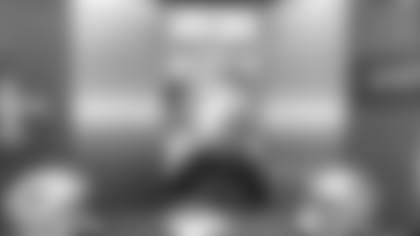New Orleans Saints Head Coach Sean Payton
Media Availability
Thursday, October 13, 2011
Opening Statement:
"Just with today's injury report: Zach Strief (knee) did not practice and Dave Thomas (concussion) did not practice. Devery Henderson (calf) was full, Jon Vilma (knee) was full, Martez Wilson (neck and shoulder) was full, John Gilmore was full and then linebacker Will Herring (left hamstring) did not practice. He went yesterday and then today did not practice with it today. Most of if not all of the emphasis today was just on third down."
What are your thoughts on David Thomas going into his third week with these concussion symptoms?
"We met yesterday. I would say he turned the corner a little bit. I think that happened at the early part of this week. That being said, we along with outside doctors want to make sure that it's 100 percent. A lot of the symptoms have gone away and it's just the sensitivity to a little light, just some things that he's working through. But I would say the early part of this week was a turning point for him. That's good news."
You usually go with three tight ends. How have you felt about only using two without David Thomas?
"We're going with two fullbacks so you would say there are four then with tight ends and fullbacks. You just have to have some flexibility within your plays in the event that someone's nicked up, then you might be in a personnel grouping where Marques Colston is the Y if you will. If I told you we have a play that is just read right, and Jimmy (Graham) is the Y in the pattern and that personnel is just 21, two backs and one tight end, there's probably a good chance that play next to it on the personnel would list 20 and so we wouldn't lose the play in the game in the event that we didn't have another tight end we wanted for the play. It forces you more than anything in the week of preparation to have plays that may be designed for Jimmy, and maybe some of them aren't, to have them backed up with when it's applicable with another personnel grouping so you can still run your offense. I was in New York, we played in the preseason against Atlanta and on one play two of our tight ends, both (Jeremy) Shockey and Dan Campbell got injured on the same play. This was the preseason but we had already had one injury the week before and all of a sudden in the second quarter we just didn't have any tight ends. That list changes real quick and you begin to scramble. You try to make sure you have where it fits backup personnel groupings that would allow you to run and some plays you would just be out of because it doesn't fit."
How would you rank the development of Adrian Clayborn, Da'Quan Bowers and Mason Foster on the Bucs defensive line and do you think they made these draft choices with the Saints offense in mind?
"I think that they've done a great job of just making an emphasis of improving and getting young, good defensive players on their team. I think we kind of approach each draft with those opportunities and sometimes you're able to and other times you end up with a different selection. With Bowers and Clayborn, those were two very well thought of ends that all of us, not just Tampa Bay or the Saints, but a lot of the league probably had high grades on. Foster was the same way that we really liked. You see these young defensive players in their front that are getting better week to week. Those are hard positions often times to find in free agency, especially the end position. They're all getting snaps and Clayborn is doing very well in his first season. He was a guy that was in here on a visit. He was a guy that was in our cloud if you will when it comes to our pick. He definitely was one of the players we had discussed. Foster was the same way. We really had good grades on him. With Bowers, he's jumped in and his health hasn't been an issue. That was the thing that a lot of people initially were somewhat concerned with. Those are three good, young defensive players that will play and be productive for a long period of time with them. When the draft takes place and your division is selecting, you pay attention to who they're selecting whether it's Atlanta, Carolina, or Tampa. The selection is always nicer when it's someone you didn't grade as high and it's not as nice when all of a sudden the selection is made and you'd like that player just as much. But those are guys that are doing well."
It seemed like you guys almost had a chance at getting Mason Foster in the draft.
"I think we felt like there was a real good chance he was going to get taken in the second round because he can run, he started the season playing in the base, very quickly he's playing three downs now. They keep him on the field in the nickel, he's a guy that can run and is very active."
Where do you see Patrick Robinson as a first round pick on the time table?
"A lot of it is by position, but Patrick is doing very well. I think we've seen a big jump from year one to year two. We're pleased. That position is one where historically, and this isn't always, but a lot of the better corners in our league were drafted high. He's someone who has that speed, who has those ball skills, and now into his second year you're seeing his development. A guy like Robert Meachem, it took a little longer because of health or for whatever reason. The key is that, not only do you have the vision, but also early on you're paying attention to the things you thought you saw in the evaluation and you're beginning to see in the course of practice. A very generic statement would be three years: first year is a rookie season, second year he still has kind of the benefit of the doubt, but usually the third year you begin to see something with the player, and that's not always but certainly Patrick has fit in and transitioned well."
By the end of three years you want the guy to start every Sunday?
"You just want to feel like you've hit one the player, he's what you thought, and you're starting to get those contributions and see the things that are going to help you win games. And yet we could find a few examples maybe after three years that some guys have gone on to have good careers that maybe in their first three years didn't. If you're just talking about a rule of thumb, sometimes at certain positions it takes longer. Quarterbacks, depending on who's in front of them, it was a little longer for Aaron Rodgers with a veteran in front of him. You just have a plan and I think you begin to see signs of it early on and hopefully the quicker the better and some guys just transition immediately."
You guys must be feeling pretty good about guys like Malcolm Jenkins, Patrick Robinson and Cam Jordan?
"Those are young players that have transitioned. It's easy to root for your draft picks because those are decision you made and yet you still have to be somewhat unbiased and pay attention to who's doing what during practices and training camp. But those are certainly good examples of guys that have transitioned and transitioned very fast into what we're doing."
Can you talk about Mark Ingram and his development?
"He's doing real well. The challenge for me with a player like Mark is just getting him enough touches and enough carries. We feel like we have real good depth there and guys that can contribute whether it's Pierre (Thomas) or Mark or Darren Sproles. Often times I think the trick is just getting him comfortable in the rhythm of a game and sometimes I can prohibit that with the play calls and what we're doing offensively. I'm kind of mindful of that and understand that. From a knowledge standpoint, he can handle all the nickel, all the base, goal line and short yardage. He's very smart. I think we're going to see more and more good things from him. Really it's just giving him those opportunities and sometimes I don't give him enough of them because we're in another personnel grouping or we're doing something else by design because we do that pretty well as well. I think that's to some degree what the tough part of it is. He's doing real well."
Do you remember when it was that you decided Mark Ingram was ready?
"I think it was very early on in training camp in the nine on seven drills and the team drills. You saw all the physical traits that we thought we had identified in the evaluation. But very quickly you recognize that he's smart. He picks things up, he doesn't repeat mistakes, he understands protections, and he's been coached hard. He's a good instinctive football player that at any time we can insert in the base but also insert in the nickel and he'd know the protections, he'd know everything just as Pierre does or Darren does or someone who's been in the system. That versatility is a huge plus, and yet he also understands what his strengths are. I think after a period of a couple weeks, his first impression and his transition was immediate. Now he just needs the experience."
Do you see this team making any moves as this trade deadline approaches?
"I think in our league it appears to always be a position specific, a player specific need as opposed to let's just see where everyone's at with everything. In other words, we need this one thing and here are two teams who have what we think we've identified and let's discuss if it's possible. You see it now, there was a trade with the Jets and the Texans. There was a receiver traded. I think there's always a specific need and a target. It's not like baseball. That's a pretty important date. It's different. Often times that is created by maybe health, an injury or something specific and now they have another two weeks before they can't trade for someone and have to sign them."
Are you feeling confident the way your roster is right now?
"You could have cut through the chase and asked if we were interested in making any trades. I don't foresee us being involved in that and yet you could say that that window always remains open if there was another team. But I don't foresee that as something we're involved in right now. It's no certainty but that would be my take on it now."
Is that accurate that Roman Harper was fined for the late hit in the end zone and did any of the quarterback hits get fined?
"Yes. That's the only one that I'm aware of. That's not to say that there couldn't be but that's the only one that I'm aware of. I probably read it just like you did."
Did you hear any clarification back from the league on Turk McBride's hit?
"No, nothing specific. We just want to make sure that we're always trying to educate our guys as to what looks legal. I think the only potential issue is if the right hand got near the chin or the cheek or the facemask area."
After talking about how these young guys have developed, what are your thoughts on how Jimmy Graham has developed?
"There's a good example. You go back with Mark Ingram, a decorated high school running back recruit that chooses Alabama and a Heisman Trophy winner in a program that won a national championship and got a lot of snaps. And then you take Jimmy Graham who was a basketball player and his final year he plays football. He gets selected to play football and at that moment in time he has 583 snaps of football in the last five years and at that very moment in time for Mark Ingram, he has 15,000 snaps of football. But that transition for Jimmy happened very quickly and what happened I thought during the latter part, the last third of the season before Tampa Bay when he got injured, you started to see him do a lot of things on a consistent basis, not only in practice, but in the game. You saw his confidence. These growth spurts that can happen, for some of you that have been here a while, it happened later for Devery Henderson. I wasn't here, but I'm just saying that it seemed like his transition took more time. But I think Jimmy's has happened very rapidly considering the amount of football he had played prior to coming to the NFL."
What are you seeing from him in these last three games when he's had over 100 yards of receiving?
"I think the thing we try to do within the package is certainly there are primary players, so anyone of these plays might initially be Marques Colston or Lance (Moore) or Robert Meachem or Darren Sproles, and yet the progression of a play sometimes takes you to another receiver. Last week it happened on one of Jimmy Graham's catches in the final drive. He wouldn't have necessarily been the primary throw and yet our quarterback is able to recognize the look he's getting defensively. What does happen though is the route runners involved in a particular play understand and recognize the importance of being exact and at the very snap of the ball I think you need to have the mentality that at this moment this is going to be thrown to me. And four times in a row it may not be and you have to be discipline enough on the fifth time to have that same approach and then it gets thrown to you. There are some plays that are simpler like the Pierre Thomas naked at the very end, he's certainly the feature on the play and if he's covered, there's a corner route by Jimmy and a rover route by Meachem. Those two other players could potentially get that play but the design of the play is for Pierre to be open in the flat. I think there is certainly a lot of confidence the quarterback has whether he comes primarily or in the later part of a progression that he's going to have a target in Jimmy."
Is there a specific moment where you saw Jimmy Graham emerge?
"There were a couple practices a year ago on Fridays where we would feature red zone, and there were two Fridays in a row where he just did a number of good things and you started to see that happen in the game. I don't know that we point to a practice or a specific game but certainly we've seen this take place over a series of six months or eight months and now at the start of this season you're seeing his confidence level grow."
Is it something you're seeing taking place in practice and translating onto the field?
"I think sometimes. It's not often that if you're not seeing it at practice and all of a sudden it happens in a game. Usually you get signs of it early on."
Do you think the rules on quarterback protection are becoming too fine in the league?
"I just think the hardest jobs on game day outside of the players playing are the guys having to officiate because the speed is so quick. How often have we all watched plays that take place and it's hard to judge? They work their tails off to try to get it right and I think the league works hard at trying to be consistent and make sure that all the crews are hearing the same instruction in regards to how we want things officiated. I think we pay a lot of attention to that. I think the biggest challenges are the ones that, like Roman's against Houston, are how we coach and are legal and later they really wouldn't or shouldn't have been a penalty and then can affect the outcome of a game. That's really existed with officiating and will always exist with officiating. They try to be and I think they work their tails off to be perfect. Sometimes that potentially can happen with or without replay with fouls that are called or may not be called. You just hope you're on the plus end of those and not the minus end of them. I think it's difficult when you deal with those, like Brian (Urlacher's) play where all of a sudden it's a catch, it's a hit, and your initial impact was if it was a launch, was it at the head, was he unprotected, I think it's difficult sometimes."
Do you think the referees need to go a little too far to protect them?
"I think that's just where we need to be careful. What's in place is the ability to come back and find if it's missed. What's not in place is to come back and redo if it was missed the other way. I think the league, the officials, the coaches, and the competition committee have and are working very hard at trying to get it as clear and clean for everyone and yet the game we play never is just that clean. It's never that easy. There's always something that comes up. We had a play come up a couple games ago where Devery (Henderson) had caught a pass with one foot in and the other foot hit the orange pylon and then landed on the white outside the end zone. If you ignore the pylon, you'd say he had one foot in and one foot out. And that was the correct rule. In other words, it was called that way. But I remember specifically thinking that the foot hitting the pylon doesn't necessarily mean that it's a touchdown and I called on that because it was something I had never seen happened before with one foot in and the other foot stepping on the orange pylon and goes on the white. Those little things that come up are hard to replicate or cover every one of them."














